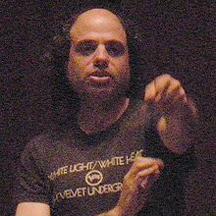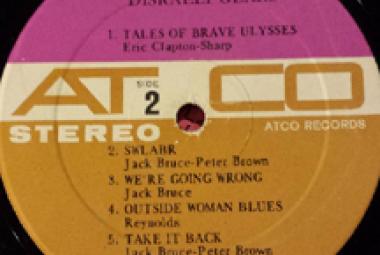Richie Unterberger (born 1962) is an American author and journalist whose focus is popular music and travel writing. (More from Wikipedia)
Quoting Richie Unterberger in Allmusic: “One of the original rock & roll greats, Little Richard merged the fire of gospel with New Orleans R&B, pounding the piano and wailing with gleeful abandon. While numerous other R&B greats of the early ’50s had been moving in a similar direction, none of them matched the sheer electricity of Richard’s vocals. With his bullet-speed deliveries, ecstatic trills, and the overjoyed force of personality in his singing, he was crucial in upping the voltage from high-powered R&B into the similar, yet different, guise of rock & roll.”
* * *
H. P. Lovecraft is a well regarded psychedelic rock band that was named after one of my very favorite authors, H. P. Lovecraft. Their first album, H. P. Lovecraft came out in 1967 and is rated 4½ stars from Allmusic and (as noted in the article on the album by Richie Unterberger) “included an underground FM radio favorite, ‘White Ship’” (named after a Lovecraft short story, “White Ship”).
(June 2014)
* * *
In 2007, Kent Records put together a CD called The Right Tracks, covering 29 of the recordings that Billy Butler made at Okeh Records. Writing for Allmusic, Richie Unterberger gives the CD 4½ stars and says: “First and foremost, [Billy] Butler, though far less celebrated than his older brother Jerry Butler, was a fine singer and songwriter in his own right, producing consistently good pop-soul discs that were rather reminiscent of the Impressions (and, at times, Major Lance, another Chicago soul artist with strong connections to Curtis Mayfield). In addition, if you are a fan of Mayfield’s mid-’60s work with the Impressions and as a songwriter/producer, this has some of his best overlooked work in the latter capacity.”
(July 2014)
* * *
The Silencers are from Michigan, with the members being Dave Leeds (bass), Rob Felenchak (drums), and Eric Toth (guitar). Richie Unterberger in Allmusic notes that the Silencers have “a darker approach than the average contemporary surf act”.
The back cover of The Silencers by the Silencers shows a flame-encircled dragster with the quote: “Link Wray & the Ventures rolled into one big ball and heaved through Dick Dale’s living room window!!!” Referring to that quote, Richie Unterberger in Allmusic says: “It’s not as mind-bending as that description would have you believe, but it’s a very respectable 1990’s surf revival effort, with excellent chops and a good sense of menace. Of their three cited influences, Dick Dale is definitely the biggest, as Eric Toth’s banzai guitar leads amply demonstrate.”
Richie Unterberger in Allmusic says that the Silencers are trying too hard to set the mood on their second album, Cyclerific Sounds. While the music doesn’t feel that way to me, it certainly is true of many of the song titles on this record, which include “Devil’s Angel’s Theme”, “Sonny’s Theme”, and “The Man from F.U.Z.Z.”.
(December 2014)
* * *
In 1967, Kim Fowley produced the sole album by the Belfast Gypsies and also co-wrote some of their songs. The band included some members of Van Morrison’s first band Them before he left to become a solo artist. The album was misleadingly named Them Belfast Gypsies (particularly as the title is laid out on the cover). Allmusic gives the album 4 stars, and Richie Unterberger notes in the write-up for the album: “Their tense version of ‘It’s All Over Now, Baby Blue’ is one of the greatest obscure Dylan covers, and the magnificent harmonica on ‘Midnight Train’ is a highlight.”
* * *
One of Kim Fowley’s best known songs is “The Trip”, the first single to be released under his own name; it was included in the soundtrack for the 2008 Guy Ritchie film RocknRolla. The song is included on the album that started the garage rock/psychedelic rock revival that began in the 1970’s and continues to this day, Pebbles, Volume 1. In his review of the Pebbles series for Allmusic, Richie Unterberger comments: “Though 1972’s Nuggets compilation reawakened listeners to the sounds of mid-’60s garage rock, it only focused on the tip of the iceberg. Behind those forgotten hits and semi-hits lurked hundreds, if not thousands, of regional hits and flops from the same era, most even rawer and cruder. . . . More than any other factor, these compilations [in the Pebbles series] were responsible for the resurgence of interest in garage rock, which remains high among collectors to this day.”
(January 2015/1)
* * *
But in Allmusic? Nothing on Certain General either – well, almost nothing. Eleven albums by Certain General are listed on Allmusic, coming out between 1984 and 2010. A short review by Richie Unterberger of their first full album, November’s Heat is provided; but this is the only album with an Allmusic rating, and there are just 8 user ratings among the 11 albums. This is from the website which has as its aim to compile “discographic information on every artist who’s made a record since Enrico Caruso gave the industry its first big boost”.
Since Allmusic has nothing else about Certain General, it is not surprising that Richie Unterberger’s review of November’s Heat is lukewarm. After granting them three stars (basically equivalent to a “gentleman’s C” in the Allmusic rating system, which goes up to five stars), Unterberger has some backhanded compliments for the album: “It’s very much a record that’s emblematic of the post-punk dark ages descending on the underground in the mid-1980’s. Funky basslines and mannered vocals (by guitarist Parker Dulany) convey a muted anguish, somber and obtuse lyrics, and not a whole lot of melody. There’s a somewhat goth mood to the sound, though it’s not as over-the-top as that of the true goth bands of the time; there’s also something of a British feel to the approach (especially in the vocals), although again it’s not quite as dyed-in-the-wool UK as actual bands from that country. It’s not as creepy or disturbing as it tries to be.”
(March 2015)
* * *
Just a couple of years ago, I finally found out what was going on when I read the discussion by Richie Unterberger in Allmusic about the differences between the American and the English releases of the first Stones album: “[T]he main difference lies in the version of ‘Tell Me’ included here, which sounds about two generations hotter than any edition of the song ever released in the U.S. – it’s the long version, with the break that was cut from the single, but the British LP and the original late-’80s Decca U.K. compact disc (820 047-2) both contain a version without any fade, running the better part of a minute longer than the U.S. release of the song, until the band literally stops playing.” Apparently that DJ had gotten his hands on a copy of the British version of the song, and I was fortunate enough to hear it that one time at an impressionable age.
(May 2015)
* * *
“Shapes of Things” by the Yardbirds is the first song written by the bandmembers that became a hit; it was released on February 25, 1966 and reached #3 on the UK singles chart and #11 on the Billboard Hot 100. Richie Unterberger has written of this song for Allmusic: “[Jeff Beck]’s guitar pyrotechnics came to fruition with ‘Shapes of Things’, which (along with the Byrds’ ‘Eight Miles High’) can justifiably be classified as the first psychedelic rock classic.”
(July 2015)
* * *















